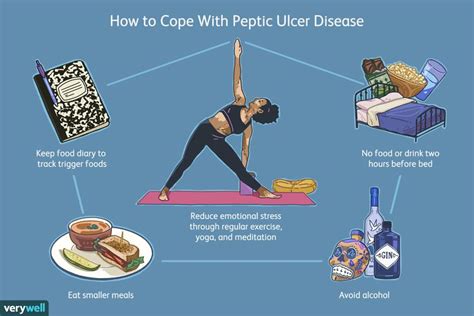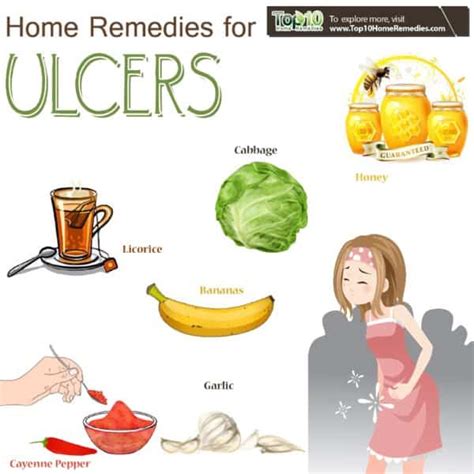Intro
Discover 7 ways to treat ulcers naturally, alleviating stomach ulcers symptoms with home remedies, dietary changes, and stress management techniques to promote healing and prevent recurrence of peptic ulcers.
The presence of ulcers can be a significant source of discomfort and pain for those affected. Ulcers are open sores that develop on the inside lining of the stomach and the upper portion of the small intestine. The most common symptoms of ulcers include burning stomach pain, feeling full after eating, and weight loss. Understanding the causes and symptoms of ulcers is crucial in finding effective treatment options.
Ulcers can be caused by a variety of factors, including infection with the bacterium Helicobacter pylori, long-term use of anti-inflammatory drugs, and excessive acid production in the stomach. The symptoms of ulcers can vary from person to person, but the most common symptom is a burning or gnawing pain in the stomach. This pain can be alleviated by eating or taking antacids, but it can also worsen at night.
In addition to the physical symptoms, ulcers can also have a significant impact on a person's quality of life. The pain and discomfort caused by ulcers can make it difficult to eat, sleep, and perform daily activities. Furthermore, if left untreated, ulcers can lead to serious complications, such as bleeding, perforation, and narrowing of the stomach or duodenum. Therefore, it is essential to seek medical attention if symptoms persist or worsen over time.
Understanding Ulcer Treatment Options

There are several treatment options available for ulcers, including medications, lifestyle changes, and alternative therapies. The goal of treatment is to heal the ulcer, prevent recurrence, and manage symptoms. Medications such as antacids, acid reducers, and antibiotics may be prescribed to reduce stomach acid, protect the stomach lining, and eliminate the H. pylori bacteria. Lifestyle changes, such as avoiding trigger foods, managing stress, and quitting smoking, can also help alleviate symptoms and promote healing.
Medications for Ulcer Treatment
Medications play a crucial role in the treatment of ulcers. Antacids, such as Tums, Rolaids, and Mylanta, can help neutralize stomach acid and provide quick relief from symptoms. Acid reducers, such as Zantac, Pepcid, and Tagamet, can reduce the production of stomach acid and prevent ulcers from forming. Antibiotics, such as amoxicillin and clarithromycin, may be prescribed to eliminate the H. pylori bacteria.Lifestyle Changes for Ulcer Management

In addition to medications, lifestyle changes can also help manage ulcer symptoms and promote healing. Avoiding trigger foods, such as spicy, fatty, or acidic foods, can help reduce stomach acid production and alleviate symptoms. Managing stress through techniques such as meditation, deep breathing, and yoga can also help reduce stomach acid production and promote healing. Quitting smoking and avoiding alcohol can also help reduce the risk of ulcers and promote healing.
Dietary Changes for Ulcer Treatment
Dietary changes can also play a crucial role in the treatment of ulcers. Eating smaller, more frequent meals can help reduce stomach acid production and alleviate symptoms. Avoiding trigger foods, such as citrus fruits, tomatoes, and chocolate, can also help reduce stomach acid production and promote healing. Incorporating foods that are high in fiber, such as fruits, vegetables, and whole grains, can also help promote healing and reduce the risk of ulcers.Alternative Therapies for Ulcer Treatment

In addition to medications and lifestyle changes, alternative therapies can also be used to treat ulcers. Acupuncture, a traditional Chinese medicine technique that involves inserting thin needles into specific points on the body, can help reduce stomach acid production and alleviate symptoms. Herbal remedies, such as licorice root, marshmallow root, and slippery elm, can also help soothe the stomach lining and promote healing. Probiotics, beneficial bacteria that can help maintain a healthy gut, can also help reduce inflammation and promote healing.
Probiotics for Ulcer Treatment
Probiotics can play a crucial role in the treatment of ulcers. Beneficial bacteria, such as Lactobacillus and Bifidobacterium, can help maintain a healthy gut and reduce inflammation. Probiotics can be found in fermented foods, such as yogurt, kefir, and sauerkraut, or taken as supplements. Studies have shown that probiotics can help reduce symptoms of ulcers, improve healing rates, and prevent recurrence.7 Ways to Treat Ulcers

Here are 7 ways to treat ulcers:
- Take medications as prescribed by your doctor
- Make lifestyle changes, such as avoiding trigger foods and managing stress
- Incorporate dietary changes, such as eating smaller, more frequent meals
- Try alternative therapies, such as acupuncture and herbal remedies
- Take probiotics to maintain a healthy gut
- Avoid smoking and alcohol
- Get enough sleep and exercise regularly
Preventing Ulcer Recurrence
Preventing ulcer recurrence is crucial in managing the condition. This can be achieved by making lifestyle changes, such as avoiding trigger foods and managing stress. Taking medications as prescribed by your doctor can also help prevent recurrence. Additionally, incorporating dietary changes, such as eating smaller, more frequent meals, and taking probiotics can also help prevent recurrence.Conclusion and Next Steps

In conclusion, ulcers can be a significant source of discomfort and pain for those affected. Understanding the causes and symptoms of ulcers is crucial in finding effective treatment options. Medications, lifestyle changes, and alternative therapies can all be used to treat ulcers. By making dietary changes, incorporating probiotics, and avoiding trigger foods, individuals can help manage symptoms and promote healing. If you or someone you know is experiencing symptoms of ulcers, it is essential to seek medical attention to prevent complications and promote healing.
What are the common symptoms of ulcers?
+The common symptoms of ulcers include burning stomach pain, feeling full after eating, and weight loss.
What are the treatment options for ulcers?
+The treatment options for ulcers include medications, lifestyle changes, and alternative therapies.
How can I prevent ulcer recurrence?
+Preventing ulcer recurrence can be achieved by making lifestyle changes, such as avoiding trigger foods and managing stress, taking medications as prescribed by your doctor, and incorporating dietary changes.
We hope this article has provided you with a comprehensive understanding of ulcers and their treatment options. If you have any further questions or concerns, please do not hesitate to comment below. Additionally, if you found this article helpful, please share it with others who may be experiencing symptoms of ulcers. Remember, seeking medical attention is crucial in preventing complications and promoting healing. Take the first step towards managing your symptoms and promoting healing by making lifestyle changes and incorporating alternative therapies into your treatment plan.
